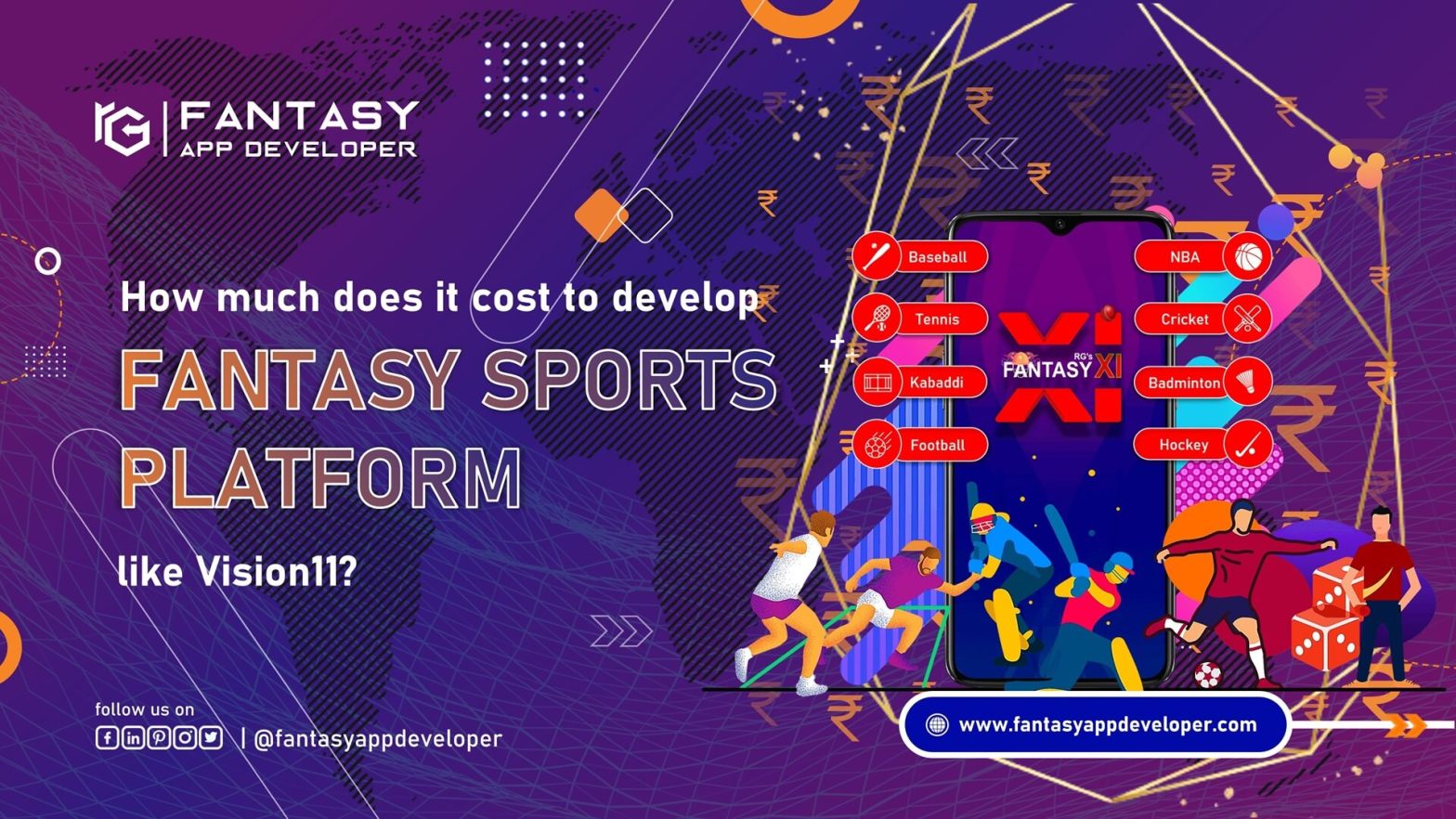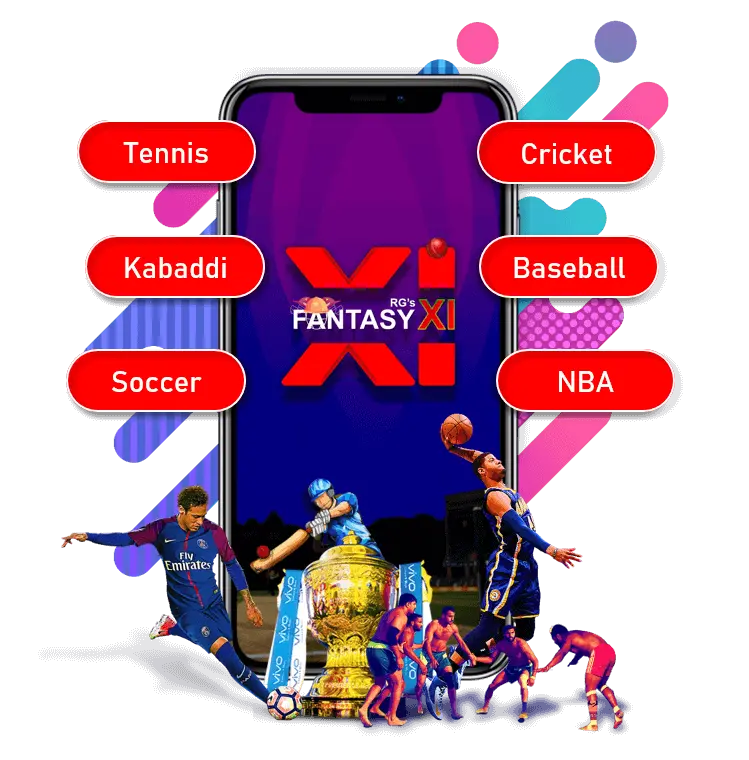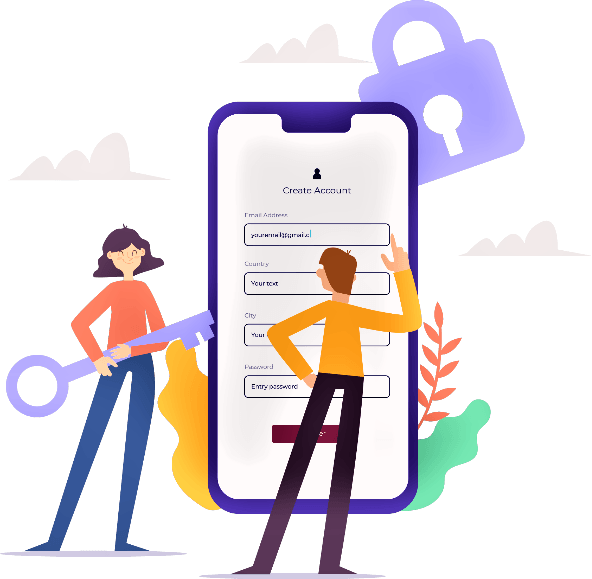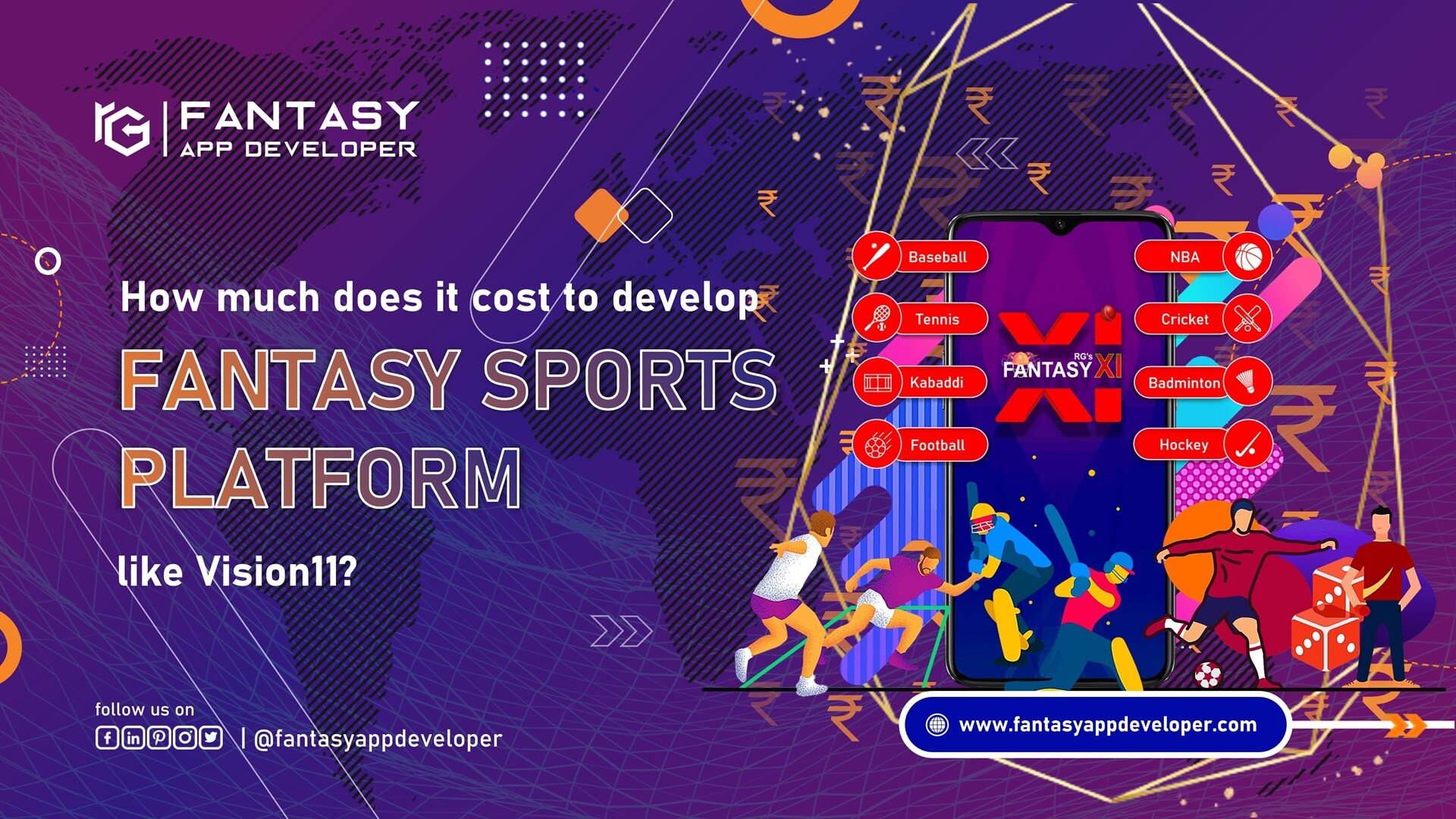
Fantasy sports applications have completely changed the way sports fans connect with the games they enjoy in the current sports industry. Fantasy sports platforms allow users to make friends, build virtual teams, and make tactical choices similar to those on immersive platforms.
However, when it comes to creating a fantasy sports app for businesses and entrepreneurs, the cost is undoubtedly one of the most crucial factors. In this blog, we’ll delve deeply into the complexities of fantasy sports app development costs while highlighting some of the important aspects of this rapidly expanding sector.
5 things to know about the Fantasy Sports Platform
Fantasy sports platforms have become an unhinged part of sports fans, offering them a great experience and a unique blend of competitive feel, strategy, and community. Here are five essential aspects to understand about these platforms:
1. User Engagement and Retention
App developers designed these platforms in a way that keeps users engaged for an extended period of time. They also add necessary and advanced features like real-time updates, player statistics, and in-game decision-making to ensure that users are actively interacting with the app. Regular notifications, bonuses, and rewards, as well as social interaction features like chat rooms and forums, help retain users and build a loyal community
2. Legal and Regulatory Considerations
Operating a platform for fantasy sports involves navigating various legal and regulatory frameworks. These regulations differ from country to country and even within regions of a single country. It’s important to know the laws regarding gambling, as some jurisdictions classify it as fantasy. It’s crucial to understand the laws regarding gambling, as some jurisdictions classify fantasy sports as games. Understanding all relevant laws is essential to avoid legal issues.
3. Monetization Strategies
There are several ways to monetize a fantasy sports platform. Take a look at these common strategies:
- Entry Fees: Users have to pay an entry fee to participate in a fantasy sports league or tournament.
- In-App Purchases: This strategic feature allows users to purchase trending goods, such as enhanced statistics or premium content.
- Advertisements: Displaying ads within the app is a great strategy to generate revenue, though it must be balanced to avoid disrupting the user experience.
- Subscription Models: Another great strategy is offering premium memberships that come with exclusive features and benefits.
4. Technology and Data Integration
Fantasy sports platforms need technology and data integration to function. Real-time data feeds from sports events are crucial for providing accurate and timely updates. This requires partnerships with data providers and a robust backend system in order to process and seamlessly display the data. Moreover, the performance, security, and user interface of the app must be in the best condition to provide an engaging and smooth user experience.
5. Community Building and Social Features
One of the major strengths of fantasy sports platforms is their ability to foster a sense of community among users. Social features like leagues with friends, public leaderboards, forums, and chat options are crucial. These features not only enhance user engagement but also help in viral marketing, as users are more likely to invite friends and share their experiences on social media.
Understanding these aspects can help form a strong foundation for anyone wanting to develop or invest resources in a fantasy sports platform, ensuring both user satisfaction and success in business.
Why businesses must invest in fantasy sports
The market size of global fantasy sports was valued at USD 24.52 billion in 2022. The estimated growth of the market is at a CAGR of 14.1%, from USD 27.46 billion in 2023 to USD 89.34 billion by 2031. The fantasy sports industry was once a niche pastime in North American and European regions, but now it has shown a remarkable surge in global popularity.
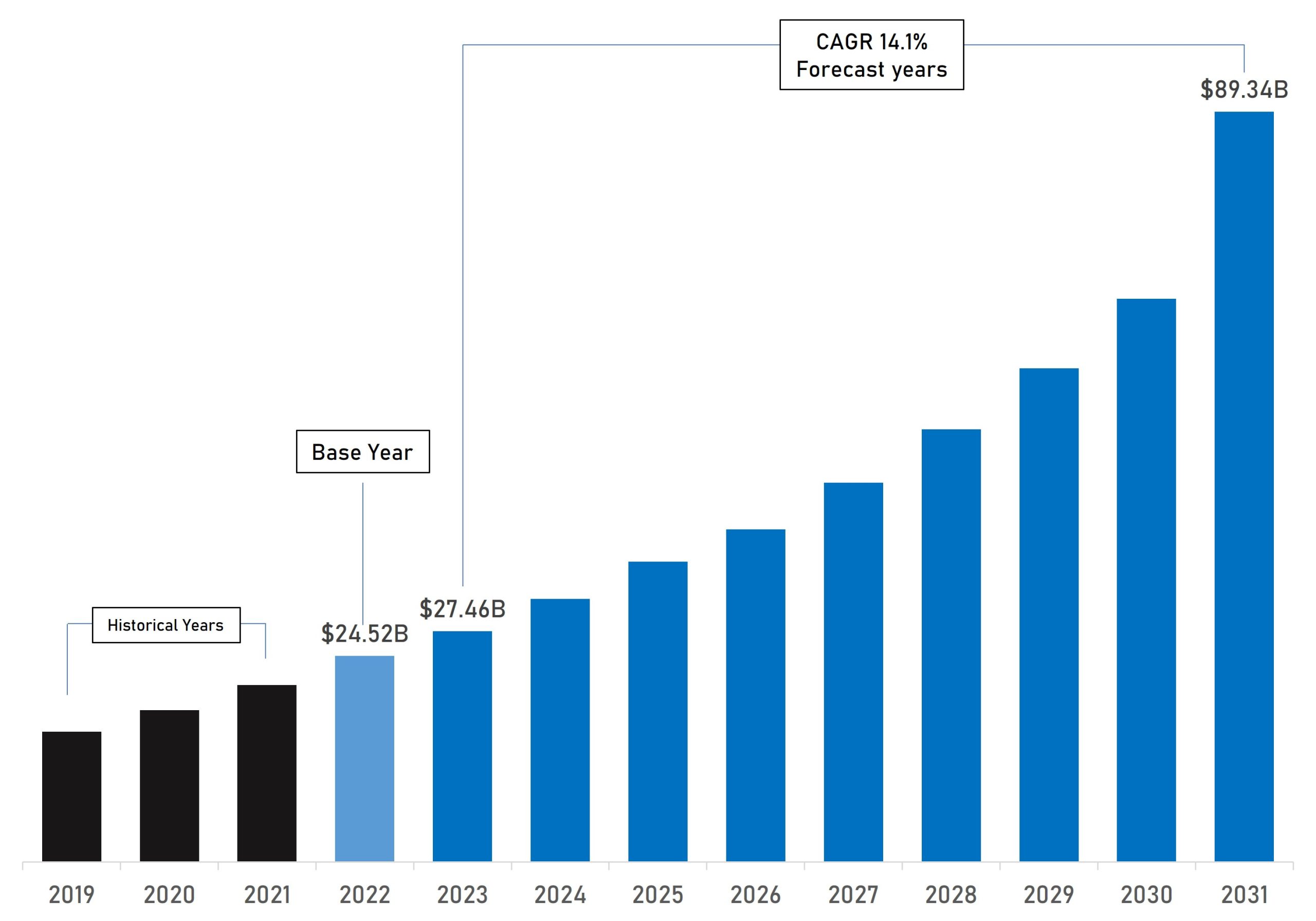
This surprising expansion is particularly highlighted in non-traditional markets, where a combination of technological advancements, evolving digital landscapes, and a deep-rooted love for fantasy sports is creating more opportunities for the growth and development of fantasy sports.
The rapidly evolving online gaming business places a premium on adopting new technologies for better and more effective operations. You can grab a good market share by introducing a feature-rich sports application for Android and iOS platforms. The revenue from fantasy sports applications in the first quarter of 2019 was $750 million, just for the entry fees. The market may rise to expect earnings beyond $1000 million by 2026.
An app packed with advanced features and stability was important in the application with the introduction of secure payment methods, a user-friendly interface, and fantasy chatbots. The fantasy sports sector has experienced significant increases in revenue creation. Customer satisfaction and operational efficiency.
Key Features of Fantasy Sports Software
The success of every Fantasy Sports Software depends on its features and functionalities. The features are classified into three major categories: user panel features, admin panel features, and additional features.
User Panel Features
- Login/Signup: Using this feature, users can quickly register using phone numbers or email IDs. It ensures a seamless start to their fantasy sports experience.
- Landing Page: It provides a brief overview of ongoing contests, upcoming events, user profile controls, and promotional offers, which enhances user engagement and accessibility.
- Profile Settings: This feature enables users to manage personal information, including adding, removing, or modifying the information, which provides personalized user experiences.
- My Team: allows users to select players for their fantasy team and provides real-time statistics and updates on player performances, enhancing strategic decision-making.
- Join Contest: Facilitates participation in both ongoing and upcoming contests, providing users with multiple engagement opportunities based on their preferences and schedules.
Looking for custom Fantasy Sports App In India?
Talk to our expert Fantasy Gaming App developers to discuss your requirements in detail.
With an assured high performance, high load balancing capacity and real-time data analysis features, RG Infotech lead the market and offers an intuitive sports betting solution at a modest price range.

Admin Panel Features
- Dashboard: It offers complete control over the app’s functioning, including user management, cost monitoring, revenue tracking, and other administrative functions.
- Payment Management: This feature tracks total revenue generated from entry fees, manages cash prize distribution, and ensures secure financial transactions, enhancing user satisfaction and operational efficiency.
- Account Management: This feature is responsible for managing user accounts efficiently, including account creation, suspension, and other related tasks, ensuring smooth user interactions.
- Results Management: It provides detailed reports on contest outcomes, including winners and performance metrics, crucial for maintaining transparency and user trust.
- Push Notifications: This feature allows admins to send real-time alerts, updates, promotional messages, and reminders to users, enhancing user engagement and retention through timely communication.
These features play a crucial role in creating a robust and engaging fantasy sports platform, catering to both user needs for immersive gameplay and admin requirements for efficient app management and revenue generation.
Cost of Vision11-like app development
The cost of creating a Vision11-like App can greatly differ depending on the region where the development is done and the hourly rate of the developers. For instance, a rough estimate suggests that the average cost is around $30 per hour. Based on this rate, a basic mobile application can cost approximately $80,000, an app with medium complexity may cost around $160,000, and an app with exceptional features can exceed $400,000.
The development time for a single platform, including both development and non-development activities, is roughly 1200+ hours. To calculate the final cost of development, you just have to multiply the time by the hourly rate specific to the region.
Here are some examples of hourly rates in different regions:
- North America: $120-$150
- Australia: $100-$120
- South America: $35-$45
- India: $20-$40
- UK: $20-$26
- Indonesia: $30-$35
- Central/North Europe: $45-$60
To calculate the Final Fantasy Sports App Cost of an app, you simply multiply the total development time by the company’s hourly rate. For example, if the development time for one platform is approximately 1600 hours, including both development and non-development time, you can use this information along with the hourly rate specific to the region where the development is taking place.
How to monetise Fantasy Sports Platform!
Monetizing a sports fantasy app involves strategically choosing from various monetization strategies to generate revenue. Here are some effective strategies commonly used in sports fantasy apps:
- Advertisements: Integrating ads within the app can be a straightforward way to earn revenue. This could include banner ads, interstitial ads, or video ads displayed during breaks in gameplay or between transitions.
- In-App Purchases (IAPs): Offering users the option to purchase virtual goods, upgrades, or premium features within the app can be lucrative. For sports fantasy apps, this could include premium access to advanced stats, exclusive content, or enhanced player management tools.
- Subscription Models: Implementing a subscription-based model where users pay a recurring fee for access to premium features or content can provide a stable revenue stream.
- Partnerships and Sponsorships: Collaborating with sports brands, leagues, or individual teams for sponsorship or promotional partnerships can be beneficial. This could involve featuring sponsored content, branded tournaments, or exclusive offers tied to real-world sports events.
- Participation and Entry Fees: Organising paid contests where users pay an entry fee to participate can be a direct revenue generator. Users can compete for prizes based on their fantasy team performance, with the app taking a percentage as revenue.
- Data Licensing and APIs: Selling or licensing anonymized user data or providing API access to third-party developers or businesses can be a less direct but potentially significant revenue stream, especially for apps with valuable sports-related data.
- Affiliate Marketing: Partnering with sports merchandise retailers or ticket vendors and earning commissions on purchases made through affiliate links within the app can be another revenue avenue.
Hire domain expert - Fantasy App Developer
Are you looking to develop a cutting-edge fantasy sports app? Look no further! Our team of domain experts specializes in creating dynamic and engaging fantasy sports applications tailored to your specific needs. At Fantasy App Developer, we understand that cost-effectiveness is crucial. Our competitive pricing ensures that you get top-notch development services without breaking the bank.
Compared to industry standards, where you have to pay $30,000 to $60,000 even for a simple app with basic features, our rates are designed to provide a basic app or a complex, feature-rich platform, Fantasy App Developer offers a cost-effective solution to suit your budget.
Moreover, we can establish subscription models tailored to offer exclusive content, advanced analytics, or ad-free experiences, providing sustainable revenue streams. We facilitate valuable partnerships with sports brands and leagues, enabling sponsored content, branded tournaments, and special promotions that further monetize your app.
Not only that, we also leveraged data monetization strategies by anonymizing user data or providing API access to third parties, ensuring additional revenue streams while respecting user privacy. Trust our experts to optimize your fantasy sports app’s monetization strategy for long-term success and profitability.
Factors affecting fantasy sports app development cost!
Here’s an organized breakdown of the factors that influence the cost of building sports fantasy apps:
Platform to Launch the App:
Before proceeding, decide whether to launch on iOS. Each platform has different development costs, so choose wisely after considering the budget and target audience preferences.
Finalize the Tech Stack:
Selecting technologies such as AR/VR, Metaverse, IoT, AI, etc. impacts development costs. Choosing the right tech stack based on app requirements is crucial for determining project costs accurately.
Looking skilled developer for your Fantasy Sport App? Or Exploring a ready-made solution?
Let’s discuss with us on coffee.
Types of sports apps:
Different sports (e.g., football, cricket) have varying complexities and development costs. Decide which sports to include based on popularity, target audience, and budget.
App Features:
The number and complexity of features significantly affect development costs. Advanced features and functionalities enhance the user experience but also increase development expenses.
3rd Party API Integration:
Integrating third-party platforms (e.g., payment gateways, and social media APIs) adds to development costs. Costs depend on the number and complexity of integrations required.
UI/UX Development:
Complex and appealing UI/UX designs enhance user engagement but also increase development costs. Invest in intuitive designs to attract and retain users.
Location of developers:
Development costs vary based on the location of the developers. For instance, developers in the US may charge differently compared to those in Asia. Evaluate quality, cost, and expertise when selecting a development location.
App Maintenance:
Post-launch maintenance, including bug fixes, updates, and improvements, is essential for app success but adds to overall costs. Factor in ongoing support and maintenance to ensure app stability and user satisfaction.
Conclusion
The above-provided details and information talk about the cost of developing a fantasy sports platform. The information highlights various aspects of fantasy sports platforms and development costs. With careful examination of these aspects, businesses and stakeholders can effectively plan and execute the development of a strong fantasy sports platform that meets user expectations and achieves long-term success in the competitive app market.
FAQ
Explore more frequently asked questions to clear your doubts about Fantasy Sports Platfrom. If you have more to ask, feel free to leave a comment!
The tech stack for fantasy sports software typically includes:
- Frontend: React Native, Swift (iOS), Kotlin (Android)
- Backend: Node.js, Python (Django), Ruby on Rails
- Database: PostgreSQL, MongoDB
- Cloud Storage: AWS S3, Google Cloud Storage
- Payment Gateway Integration: Stripe, PayPal
- Analytics: Google Analytics, Firebase Analytics
- Push Notifications: Firebase Cloud Messaging, Apple Push Notification Service (APNs).
The development timeline for a fantasy sports app like Vision11 can differ depending on complexity, features, and team efficiency. Typically, it may take around 3 to 6 months for basic features and up to 9 to 12 months for a more complex app with advanced features.
Choosing between an in-house team and a development company for fantasy sports app development boils down to expertise, cost-effectiveness, and project efficiency. Development companies offer specialized skills and streamlined processes, while in-house teams provide direct control and communication but may involve higher long-term costs.
In India, several types of fantasy sports platforms are popular:
- Cricket: Fantasy cricket platforms dominate due to the immense popularity of cricket in India.
- Football: Fantasy football platforms are also prevalent, especially during major football tournaments and leagues.
- Kabaddi: Fantasy Kabaddi platforms cater to the growing interest in this traditional sport.
- Other Sports: Some platforms offer fantasy leagues for sports like basketball, hockey, and tennis, catering to niche sports enthusiasts.
These platforms cater to different sports preferences among Indian users, providing diverse options for fantasy sports enthusiasts across the country.
